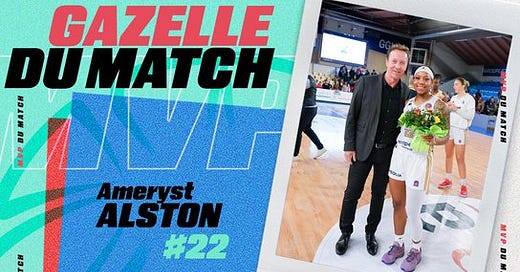Overseas Hoop Dreams
Dreams for athletes overseas can turn into nightmares...time is now for change
Ameryst Alston recently earned MVP honors for BLMA (France) against Lointek Gernika Bizkaia (Spain). This is an important feat in what was a highly competitive EuroCup game, , which we at The Athlete’s Advocate celebrate in her journey. Alston has storied career so far. She was two-time Ms. Ohio at Canton McKinley High School, first-team All-Big Ten three consecutive seasons for Ohio State finishing 4th all-time leading scorer with 2,165 points, and was drafted by the New York Liberty in the WNBA Draft.
Alston is living the dream that may young athletes can aspire to achieve. However, not too long ago, Alston was confronted with an unimaginable nightmare that unfortunately many athletes face when playing internationally.
Alston was stopped and denied entry into Istanbul, Turkey at the airport. She was later detained for extended periods only to be deported back to the United States. Her former Turkish club, Elazig Basketball, failed to properly submit a residency permit for Alston causing her to experience this traumatizing event. This dereliction of duty is not unique.
For an athlete (any person for that matter), authorities detaining you and treating you as improperly or illegally entering a country can be a horrible experience. Traveling across continents can be stressful enough, but to have to deal with formal accusations, detention, and ultimately denied entry can have a significant impact and put athletes in a precarious, dangerous position.
Personal views aside, it is not ancient history where one of the most notable female basketball players ever was unlawfully detained in a foreign land with little prospects for freedom. It required intense international intervention to secure freedom. Unfortunately, these are thoughts and fears that go through every athlete’s mind with little to no protection.
As accomplished, empowered, experienced, educated, and supported as professional athletes working overseas may feel, they are realistically left to fend for themselves.
Professional clubs represent the interest of the organizations. Their primary motives are to secure profits and championships. The expectations are that US players perform and produce at the highest levels. Not living up to expectations can result in getting waived, sometimes mid-season. Athletes are easily replaced. Even if they produce, they face constant fear if the club isn’t winning enough or in the right fashion. The dynamic and power structure is tilted in favor of the professional clubs. Things like trusting clubs to understand and handle immigration matters like Alston are not always the case.
Other individuals—like agents, managers, and attorneys—can equally be powerless and ineffective. In the case of experienced European-based agents, many represent a large number of clients. It benefits them to have close and arguably chummy relationship with the clubs they are serving where they are sending their clients. Indeed, payment structure may involve the club paying the agent directly, which creates an inherent conflict of interest. US-based agents working with overseas teams may not understand the landscape, including things like immigration matters and culture in the continent where the players are spending approximately 9 months of their lives. In the case of Brittney Griner, the same inner circle that fought hard for her freedom and return was the same team that allowed a proud, Black lesbian to go work in a country that is internationally notorious against certain lifestyles and diplomatically in competition (or conflict) with the US.
The time is now that professional athletes that work and compete overseas receive protection. Professional sports in the US boasts of the unions and players’ associations. Many countries where our athletes play have strong, historic labor movements and representation. Yet athletes go there and are left to their own devices with little other than a contract (in some cases not worth the paper it’s written on).
The good news is that there have been current and former athletes who have been vocal. They have publicly brought to light horror stories athletes face from being stranded in countries, victims to local violence, mistreatment by coaches, and clubs and agents being the problem. Recently, professional athlete, player advocate, and founder of WEVOLV communicated the following:
There are indeed many ‘vultures’ both intentional and unintentional. The time is NOW for former and current athletes to stand for change and recalibrate an unbalanced system.





